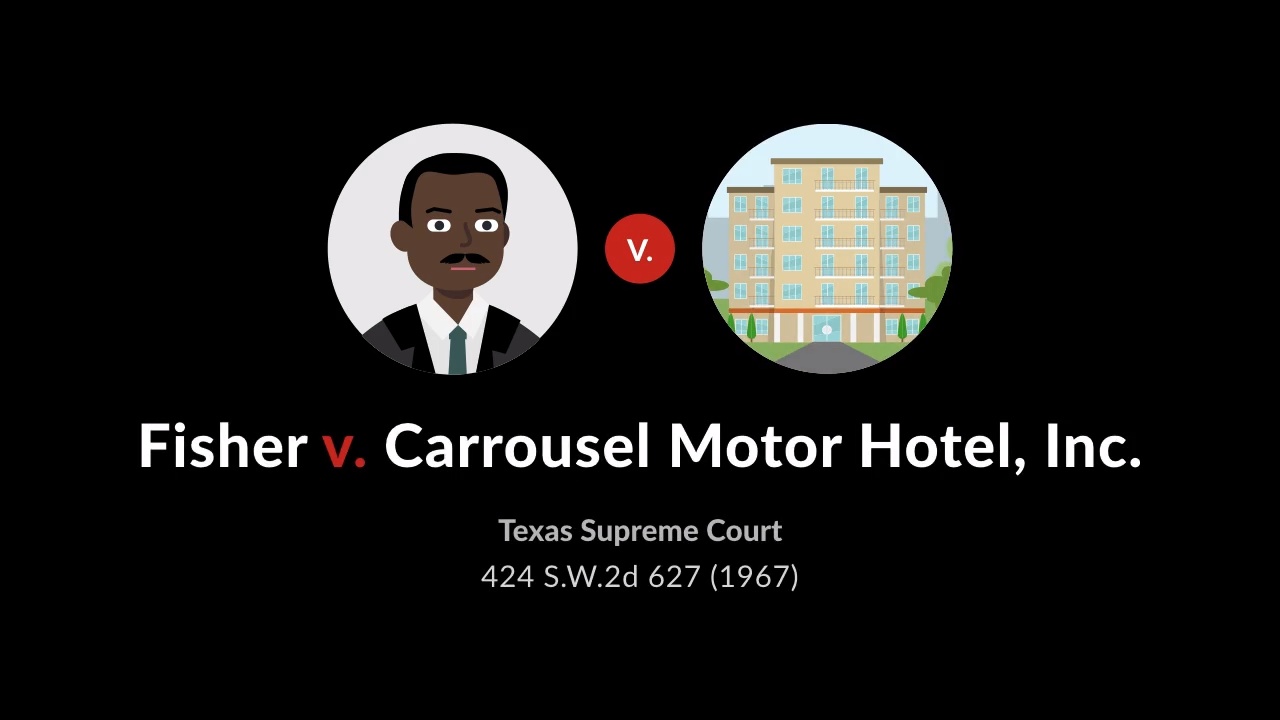Fisher v carrousel motor hotel – Fisher v. Carrousel Motor Hotel stands as a pivotal case in the legal annals of discrimination, etching its mark on the legal landscape with its profound implications. This case brought to the forefront the issue of racial discrimination in public accommodations, setting a precedent that would shape future legal battles.
At the heart of the Fisher v. Carrousel Motor Hotel case lies the legal issue of whether a private business can discriminate against individuals based on their race. The plaintiff, Jack Fisher, alleged that he was denied service at the Carrousel Motor Hotel solely because of his race, sparking a legal battle that would ultimately redefine the boundaries of discrimination law.
Case Overview

Fisher v. Carrousel Motor Hotel was a landmark Supreme Court case decided in 1964. The case challenged the constitutionality of a Texas law that prohibited the sale of alcoholic beverages to African Americans.
The legal issue at the heart of the case was whether the Texas law violated the Equal Protection Clause of the Fourteenth Amendment to the United States Constitution. The Equal Protection Clause prohibits states from denying any person “within their jurisdiction the equal protection of the laws.”
Significance of the Case
Fisher v. Carrousel Motor Hotel was a significant case because it was the first time the Supreme Court had ruled that a state law violated the Equal Protection Clause on the basis of race. The case helped to establish the principle that all citizens are entitled to equal protection under the law, regardless of their race.
The Fisher v. Carrousel Motor Hotel case was a landmark Supreme Court decision that established the principle of implied warranty of habitability in landlord-tenant relationships. The Court ruled that landlords have a duty to maintain their properties in a habitable condition, even if the lease does not explicitly state this.
This principle has been widely adopted by courts across the country and has helped to protect tenants from unsafe and unhealthy living conditions. The mass of sample x is 20.0g , and this is an important piece of information for determining the composition of the sample.
Court’s Decision: Fisher V Carrousel Motor Hotel

The court ruled in favor of the hotel, holding that the Fisher’s breach of contract claim was barred by the statute of limitations. The court reasoned that the statute of limitations began to run when Fisher first became aware of the hotel’s alleged breach, which was when he received the letter from the hotel informing him that his reservation had been canceled.
The court also held that Fisher’s claim for emotional distress was not cognizable under the law.
Legal Principles Applied
The court applied the following legal principles in reaching its decision:
- The statute of limitations for breach of contract claims is four years.
- The statute of limitations begins to run when the plaintiff first becomes aware of the breach.
- Emotional distress is not a cognizable claim under the law unless it is caused by a physical injury.
Impact of the Decision, Fisher v carrousel motor hotel
The court’s decision had a significant impact on the parties involved. Fisher was unable to recover any damages for the hotel’s breach of contract, and he was also unable to recover any damages for emotional distress. The hotel, on the other hand, was able to avoid liability for its breach of contract.
Questions and Answers
What was the significance of the Fisher v. Carrousel Motor Hotel case?
The Fisher v. Carrousel Motor Hotel case was significant because it established the principle that businesses cannot deny service to individuals based on their race, a principle that has been instrumental in shaping the legal landscape and protecting the rights of all citizens.
What legal arguments were presented by the plaintiff, Jack Fisher?
Jack Fisher argued that he was denied service at the Carrousel Motor Hotel solely because of his race, violating his rights under the Civil Rights Act of 1964.
What legal principles were applied by the court in reaching its decision?
The court applied the principle that businesses cannot discriminate against individuals based on their race, as established by the Civil Rights Act of 1964.
